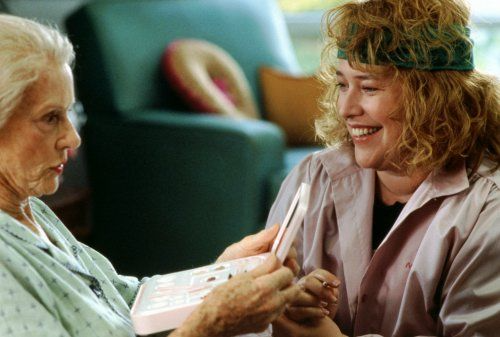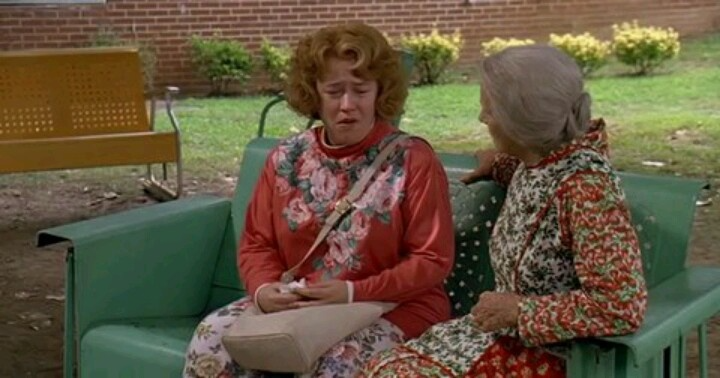
While Fried Green Tomatoes is often remembered for the fiery love between Idgie and Ruth, the film’s second core relationship — between Evelyn Couch and Ninny Threadgoode — is equally profound. This unlikely friendship, forged in the stale halls of a nursing home, becomes a quietly transformative force. Through Ninny’s stories, Evelyn undergoes a psychological and emotional rebirth — a journey from invisibility to empowerment, from stifled housewife to roaring “Towanda.”
Let’s explore how their connection works on a psychological level — a dance between storytelling, emotional validation, and rediscovery of identity.
Evelyn Couch: The Lost Self
When we meet Evelyn (played by Kathy Bates), she’s the embodiment of quiet desperation. Middle-aged, overweight, overlooked by her husband, and struggling with low self-worth, Evelyn is caught in what developmental psychologist Erik Erikson described as the crisis of stagnation vs. generativity — a point in midlife where individuals either continue to grow and contribute or retreat into inertia and despair.
Evelyn feels invisible. Her needs go unmet. Her voice is ignored. She hides behind diet plans, self-help tapes, and a forced smile. Psychologically, she’s stuck in learned helplessness — the belief that nothing she does will change her circumstances. She’s not just unhappy; she’s disempowered.
And then, she meets Ninny.
Ninny Threadgoode: The Storytelling Healer
Ninny (Jessica Tandy) is everything Evelyn is not — vibrant, curious, joyful, and grounded in her sense of self. Despite being elderly and in a nursing home, Ninny radiates purpose. And she carries with her a treasure: stories.
From a psychological standpoint, Ninny acts as what Jungian psychology would call a mentor archetype or a wise elder. She holds knowledge, perspective, and emotional warmth — qualities that Evelyn is starving for.
More specifically, Ninny becomes what psychologist Donald Winnicott would describe as a “good enough mother” — someone who offers consistent emotional holding, attunement, and presence. Though not maternal in a literal sense, Ninny gives Evelyn the one thing she’s never had: someone who sees her, listens to her, and believes she can be more.
Storytelling as Psychological Mirror
Ninny doesn’t tell Evelyn what to do — she tells her about Idgie and Ruth. But the genius of her approach lies in projective identification: by watching Idgie stand up for what’s right, and Ruth take control of her own life, Evelyn begins to see herself in those stories. The characters become mirrors, and Ninny’s tales act as a safe, non-threatening way for Evelyn to examine her own stuckness.
This narrative therapy — the act of healing through story — is a key turning point. Evelyn isn’t directly told to change. She’s inspired to. This is far more psychologically potent because the transformation comes from within.

The Emergence of “Towanda!”: Reclaiming Power
Evelyn’s gradual transformation reaches its hilarious and cathartic peak in the iconic parking lot scene, when she smashes the car of two younger women and yells “Towanda!” — her new alter ego. This moment, both comic and symbolic, is about reclaiming agency.
Psychologically, Towanda represents Evelyn’s shadow self — the repressed, aggressive, assertive part of her psyche that she was taught to suppress. Ninny doesn’t teach Evelyn to suppress her anger; she helps her reclaim it in a way that’s humorous, safe, and ultimately empowering.
This is what Carl Jung called individuation — the process of becoming a fully integrated self by acknowledging all parts of the psyche. Through Ninny’s guidance, Evelyn doesn’t just improve — she becomes whole.
Intergenerational Healing and Female Legacy
Ninny and Evelyn are from different worlds, different generations, even different social classes — yet their connection transcends those barriers. In many ways, Ninny is passing on the legacy of Idgie and Ruth through her stories — but also offering Evelyn something much deeper: permission.
Permission to live. To fight. To laugh. To take up space.
Their relationship becomes a form of intergenerational healing — a concept in psychology where older generations help the younger resolve inherited patterns of silence, repression, or suffering. Evelyn inherits not just the stories of strong women — she inherits the spirit behind them.
The Quiet Power of Non-Judgmental Companionship
One of the most psychologically healing aspects of Ninny’s presence is her total lack of judgment. Evelyn doesn’t need to impress her, lose weight, or pretend. She can be messy, insecure, even angry — and Ninny meets her with curiosity and warmth.
This creates a secure emotional environment where real growth is possible. In therapeutic terms, it mirrors the core conditions for change identified by Carl Rogers: empathy, congruence, and unconditional positive regard. Ninny provides all three — not in a clinical setting, but in a rocking chair, over stories and laughter.
Is Ninny Really Idgie? A Psychological Interpretation
The film subtly suggests that Ninny might be Idgie Threadgoode — aged, renamed, but still as mischievous as ever. Whether or not it’s true, the psychological symbolism is powerful.
If Ninny is Idgie, then she becomes more than a storyteller — she becomes the embodiment of everything Evelyn aspires to be. Courageous. Free. Wild. In this view, Evelyn’s transformation is a kind of psychic inheritance. The past and present merge. Identity transcends time.
Even if she isn’t literally Idgie, Ninny is still the spark. The gentle guide. The witness to Evelyn’s rebirth.
A Friendship That Sets the Soul on Fire
The relationship between Evelyn and Ninny is not dramatic or romantic — but it is essential. It reminds us that transformation doesn’t always require massive upheaval. Sometimes, it begins with a story. A laugh. A visit. A woman who says, “I see you.”
Psychologically, Evelyn’s healing is a triumph of connection. It’s about finding voice, claiming space, and shedding the roles that suffocate us. And Ninny — with her quiet wisdom, sharp wit, and open heart — is the key that unlocks that door.
Their friendship is a masterclass in emotional support, storytelling as therapy, and the power of simply being seen.
So while Idgie and Ruth taught us how to love boldly, Ninny and Evelyn teach us how to come back to ourselves — one fried green tomato at a time.
